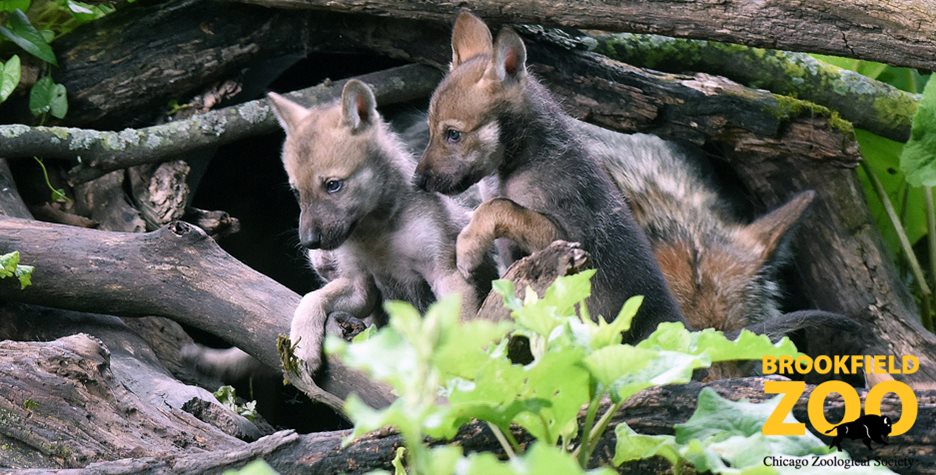01
Jul
In the News: Birth of Mexican gray wolf pups a success story for Brookfield Zoo

Brookfield Zoo is celebrating its first births of Mexican gray wolf pups.
Born in late May, the pups charmed visitors Tuesday morning as they trotted in and out of their den, following their mother about and playing in the lush green of their woodland enclosure at the west suburban zoo. But beyond being what onlookers were calling “so adorable,” the pups also represent the zoo’s active participation in an effort to save an animal that is listed as endangered.
The 4-week-old pups are being weaned and venturing more and more outside to explore with first-time parents — mother Zana, 3, and father Flint, 5. Although zoo officials believe there are four pups, litter size won’t be certain until staff can enter the den to do a wellness check in July, said zoo spokeswoman Sondra Katzen.
Mexican wolves once heavily populated the Southwest, but by 1976 they were listed as endangered. A breeding program was introduced to increase their numbers and strengthen the genetic diversity of the wolves in the wild.
Maggie Dwire, a biologist for the U.S. Fish and Wildlife Service and assistant Mexican wolf recovery coordinator in New Mexico, said the wolves typically breed in February and March, and have litters of four to six in April and May.
Brookfield Zoo is one of 55 zoos and sanctuaries in the U.S. and Mexico participating in the Mexican Wolf Species Survival Plan, she said. Each year members of the plan determine how many pups need to be produced to keep the captive population at its target level of about 300. Last year, she said, they decided to arrange for 20 breeding pairs.
Although she does not have data from the approximate 18 facilities in Mexico, Brookfield is one of five in the U.S. that she knows produced pups.
The pups from these pairings are then considered for the U.S. Fish and Wildlife’s pup-fostering efforts. Very young pups are moved from the captive litter to a similar-aged wild litter so the receiving parents will raise them as their own.
But Zana and Flint’s pups were born too late in May, later than those in the wild, and timing wasn’t right. “It’s critical,” Dwire said.
Brookfield’s pups will remain at the zoo at least until a second litter is born to their parents hopefully next year, Katzen said. It gives them the opportunity to help raise the second litter and learn parenting skills. Depending on their genetics and disposition it’s possible then that some will be considered for release into the wild.
The first successful fostering of wolf pups in the wild included the offspring of Ernesta, a Mexican gray wolf from Brookfield Zoo who was released in the wild and later gave birth.
You can read the story and see videos and photos of the Mexican wolves at Brookfield Zoo on the Chicago Tribune website.
_______________________________________________________________________________________________________
Click here to join our email list for Mexican gray wolf updates and action alerts.
Visit us on Facebook here.
Donate to support our work for Mexican gray wolf recovery here.



